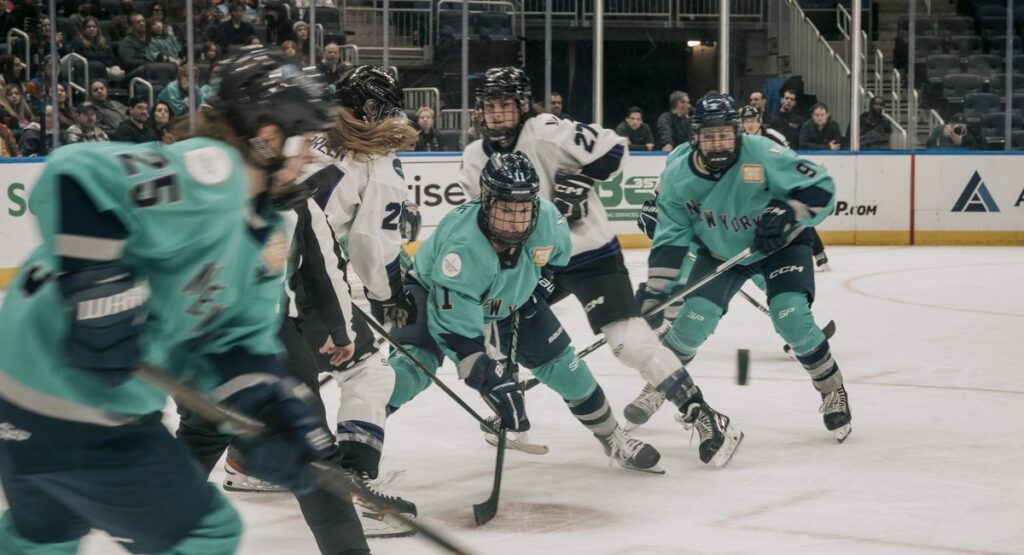The Professional Women’s Hockey League has seen measurable turnout across the United States and Canada during its inaugural season, but New York’s team hasn’t been as lucky.
Teams in Minnesota and Toronto have sold between 13,000 and 19,000 tickets for home games. Montreal has even sold out the 21,000-seat Bell Centre for a game in mid-April. But New York has seen the lowest turnout numbers in the league: UBS Arena on Long Island has yet to see more than 5,000 fans for a single game since the season started in January. Crowds were even smaller at another venue the team used for select home games this year in Bridgeport, Connecticut.
League officials, sports marketing experts and fans told Gothamist that fans’ unfamiliarity with the area’s newest, nameless teams and oversaturation in the New York metro area may have played a part.
[–>
Empty seats rival fans as they cheer on the New York Professional Women’s Hockey League team at UBS Arena on Sunday, March 3.
Scott Heins for Gothamist
Minnesota transplant Sam Haney and her friends were riding the Long Island Rail Road from Brooklyn to Belmont Park to cheer on New York’s team on March 2. The team was going to play her home state at UBS.
She and her friends said they’re excited to support women’s sports but lamented the lack of turnout for the team.
“I think there’s so much to do in New York,” Haney said, speculating on why there weren’t more fans on the fairly empty LIRR train on a Sunday afternoon. “There’s less to do in Minnesota. … Also it’s a hockey state.”
PWHL Vice President of Hockey Operations Jayna Hefford said the league knew it’d have its work cut out for it in New York.
“We were eyes wide open,” she said. “We knew this was going to be a tough market because it’s a big market. There’s lots of professional teams and there’s lots of competition for people’s time and their money.”
The team has also had a challenging season on the ice. Despite winning the first-ever PWHL game in January, New York’s team has sat at the bottom of the league’s standings and appears unlikely to make the playoffs this season.
Still, Hefford said the PWHL believes it can grow in New York’s market and pointed to the success of other professional women’s teams in other sports — the Liberty in the WNBA and Gotham FC in soccer — as the league looks to season two and the draft in June.
Bri Newland researches sport participation from a consumer perspective at NYU and offered some suggestions for what might help New York’s turnout troubles as the league gears up for its second season.
Having the team focus on one market would help it build its brand, Newland said. Assigning names to the teams would also help: Think of mascots and other marketing opportunities.
[–>
Fans cheer on the New York Professional Women’s Hockey League team at UBS Arena on Sunday, March 3.
Scott Heins for Gothamist
Trinity Elliott, a spokesperson for PWHL New York, said both issues are a function of time constraints.
The league and locations of the teams were only announced in August when billionaire Mark Walter — who owns the Los Angeles Dodgers baseball club — purchased a previous iteration of a women’s hockey league. So there wasn’t time to choose names, and in New York’s case, the team played where it could secure the space with short notice.
Elliott compared the first season to building an airplane that’s already in the air. And looking beyond arena logistics, Newland said there were bigger hurdles that could help the league draw more attention to itself over the airwaves.
“Exposure at the right time matters,” Newland said. While women’s sports can be found on TV, she said games need to be in competitive timeslots to maximize viewership. “That exposure is important not just for fans, but for sponsorships.”
[–>
Goalie Abbey Levy takes the ice for New York’s WPHL game against Minnesota on Sunday, March 3.
Scott Heins for Gothamist
The challenges facing women’s hockey in New York are personified in the team’s goalie Abbey Levy, a Rockland County native. She said she agrees that New York just isn’t as much of a hockey state as a state as Minnesota. She said it has consequences for little girls who want to play the sport.
“When I was a kid, I would play on the nearest boys’ club,” said Levy. “It’s sad because little girls around here, a lot of their dreams died out because there was just nothing to go to for a girl.”
Levy said that while she’s noticed more fans in the stands for each passing game at UBS Arena this year, that’s ultimately not what matters to her.
“For women, it didn’t matter for the ones before us if there was people in the stands,” she said. “They got up, they played in the Olympics, they did everything they could. We just play this sport because we love it.”
[–>
Casey Muller (left), Deanna DeMeo (center), and Rosabella Garczynski (right) at the Professional Women’s Hockey League match between New York and Minnesota on Sunday, March 3 at UBS Arena.
Scott Heins for Gothamist
Now, Levy is inspiring a newer generation of girls who have more opportunity than she did. Casey Muller, Deanna DeMeo and Rosabella Garczynski, all 10 years old, play ice hockey together and were in the stands at a recent game at UBS, holding up signs of encouragement for the players.
They said they have more fun at PWHL games than at men’s matches.
“You watch the women play and I don’t know how to explain it,” Garczynski said. “It’s like, that could be you one day.”

